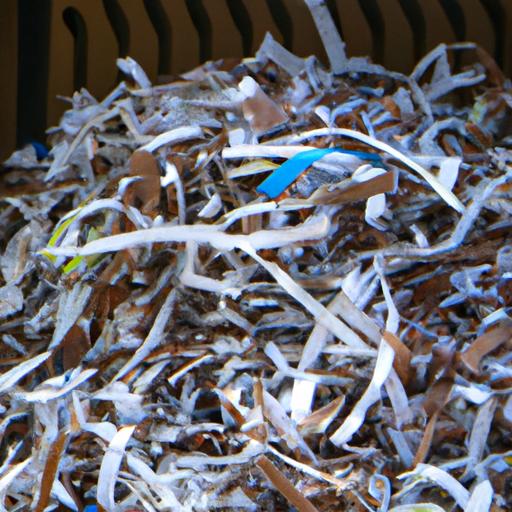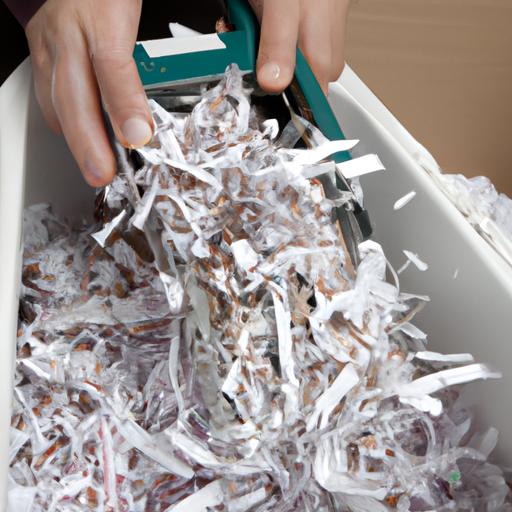What to Do with Shredded Paper: Recycling, Composting, Reusing, and Disposing
Table of Contents
Shredded paper is a common by-product of many offices and homes. While it may seem like a nuisance, shredded paper can actually be quite useful if handled properly. In this article, we will explore some of the best ways to deal with shredded paper, including recycling, composting, reusing, and disposing.
Recycling Shredded Paper

Recycling shredded paper is a great way to reduce waste and protect the environment. According to the Environmental Protection Agency, recycling one ton of paper can save up to 17 trees, 7,000 gallons of water, and 4,100 kilowatts of energy. That’s a significant impact for a relatively small effort.
To recycle shredded paper at home, simply collect it in a paper bag or cardboard box and place it in your recycling bin. Be sure to check with your local recycling facility to ensure they accept shredded paper, as some may have specific guidelines or restrictions.
If you have a larger amount of shredded paper, you can also take it to a local recycling center or contact a paper shredding company that offers recycling services. These companies will collect your shredded paper and transport it to a recycling facility.
By recycling your shredded paper, you not only reduce waste but also help conserve valuable resources and energy. So, the next time you have a pile of shredded paper, don’t toss it in the trash – recycle it instead.
Composting Shredded Paper
Composting is another great way to make use of shredded paper. Shredded paper is a great source of carbon, which is an essential component of compost. Composting also helps reduce waste and provides nutrient-rich soil for gardening.
To compost shredded paper, simply mix it with other compostable materials such as food scraps, yard waste, and other organic matter. Be sure to avoid adding glossy or coated paper, as these materials can contain harmful chemicals.
Once you have a good mix of compostable materials, add some water and turn the pile regularly to encourage decomposition. Within a few months, you’ll have nutrient-rich compost that can be used to fertilize your garden or potted plants.
Composting shredded paper not only reduces waste but also helps improve soil health and reduce greenhouse gas emissions. So, if you’re looking for a way to make your gardening more sustainable, give composting shredded paper a try.
Composting Shredded Paper
Composting is another great way to make use of shredded paper. Shredded paper is a great source of carbon, which is an essential component of compost. Composting also helps reduce waste and provides nutrient-rich soil for gardening.
To compost shredded paper, simply mix it with other compostable materials such as food scraps, yard waste, and other organic matter. Be sure to avoid adding glossy or coated paper, as these materials can contain harmful chemicals.
Once you have a good mix of compostable materials, add some water and turn the pile regularly to encourage decomposition. Within a few months, you’ll have nutrient-rich compost that can be used to fertilize your garden or potted plants.
Composting shredded paper not only reduces waste but also helps improve soil health and reduce greenhouse gas emissions. So, if you’re looking for a way to make your gardening more sustainable, give composting shredded paper a try.
Reusing Shredded Paper
If you’re feeling creative, there are many ways to reuse shredded paper at home. One option is to use it for crafting projects such as paper mache, handmade paper, or even as filler for homemade pinatas. Shredded paper can also be used as packing material for shipping fragile items or storing delicate items in your home.
Another option is to donate your shredded paper to animal shelters or pet stores. Shredded paper can be used as bedding for small animals such as hamsters, guinea pigs, and rabbits. It provides a soft and absorbent surface for the animals to sleep on and can also be used as a nesting material.
If you have a large amount of shredded paper, you can also consider donating it to local schools or community centers. Many art teachers and craft instructors are always looking for materials to use in their projects, and shredded paper can be a great option.
By reusing shredded paper, you not only reduce waste but also give it a new purpose and extend its lifespan. So, the next time you have a pile of shredded paper, think twice before tossing it in the trash – there may be many ways to give it a new life.
Disposing of Shredded Paper
While recycling and composting are great options for shredded paper, there may be times when disposal is necessary. However, it’s important to dispose of shredded paper properly to avoid negative environmental impacts.
The proper way to dispose of shredded paper is to place it in a sealed bag and throw it in the trash. This helps ensure that the paper doesn’t become litter or fly away in the wind. It’s also important to avoid mixing shredded paper with other recyclables, as this can contaminate the recycling stream.
When disposing of shredded paper, it’s important to avoid burning it. Burning shredded paper can release harmful chemicals into the air and contribute to air pollution. It’s also important to avoid using shredded paper as packing material, as it can create a mess and be difficult to clean up.
Alternatives to Shredding Paper
While shredding paper is a common way to protect sensitive information, there are alternatives that can be more environmentally friendly. One option is to use a shredding service that offers recycling or composting. Another option is to switch to electronic documents whenever possible, which eliminates the need for paper shredding altogether.
If shredding paper is still necessary, consider using a shredder that produces longer strips rather than confetti-like pieces. These longer strips are easier to recycle and compost and can help reduce waste.
In conclusion, shredded paper doesn’t have to be a burden on the environment. By recycling, composting, reusing, or disposing of it properly, we can reduce waste and protect valuable resources. So, the next time you’re faced with a pile of shredded paper, consider the options and make a difference for the planet.

